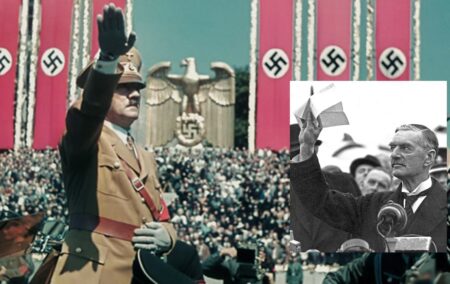It was ironic that Jan Smuts came to power as a result of the failure of a policy which he supported.
Next week, Wednesday 3 September will mark the 80th anniversary of the British declaration of war against Nazi Germany, South Africa’s parliament deciding on 4 September 1939 to follow suit.
Faced with what he described as a ‘mutiny’ in his cabinet, Prime Minister Neville Chamberlain was forced finally to abandon his policy of appeasement and issue the declaration. Had he not done so, his government would have fallen. Six thousand miles away in Cape Town, Prime Minister Barry Hertzog’s government did fall when it proposed to keep South Africa out of the war, and Jan Smuts became prime minister.
Today, ‘appeasement’ is a swearword. This was not always so. It was Smuts himself who put the word into use to describe the policy of trying to deal with what he thought were justified German grievances over the terms imposed on that country at the conference in Versailles at the end of the 1914-1918 war.
It was ironic that Smuts came to power as a result of the failure of a policy which he supported. It was also ironic that he supported Chamberlain’s policy when he was a member of Hertzog’s pre-war cabinet, even though his great friend Winston Churchill repeatedly warned that trying to appease Adolf Hitler would lead both to war and to dishonour.
If Smuts coined the term ‘appeasement’ for reconciliation in international politics, it was Churchill who coined the term ‘summit’ to describe diplomacy of the kind that Chamberlain pioneered in his three trips to see Hitler in the second half of September 1938 in pursuit of appeasement.
Chamberlain’s efforts to avoid war were doomed from the start. In the first place, even though he described Hitler as ‘the commonest little dog’, he was vain enough to think Hitler would not deceive him. Secondly, his government had repeatedly made it clear to the Germans that the United Kingdom would not go to war to keep either Czechoslovakia or Austria out of his grasp. Thirdly, nearly a year before his own meetings with Hitler, one of Chamberlain’s senior colleagues, Lord Halifax, had visited the Führer and intimated that the Versailles terms could be reviewed.
And, fourth, Chamberlain himself told Hitler at the first of their five meetings that the British endorsed his demand for ‘self-determination’ for the ethnic Germans in Czechoslovakia’s Sudetenland regions: secure in the knowledge that the British had acceded to his key demand, and confident that they would force the Czechs to comply, Hitler could make one or two minor concessions on timing and technicalities, which he did, enabling Chamberlain to return in apparent triumph from Munich after their final meeting waving the agreement they had signed promising ‘peace for our time’ and, preposterously, ‘peace with honour’.
Once Austria had been annexed in 1938 and Czechoslovakia occupied and dismembered in March 1939, Chamberlain issued his guarantee to Poland, which was clearly next on Hitler’s menu. By this time, Hitler had good reason to doubt that the British would fight, and he was indeed surprised by Chamberlain’s declaration of war. Hitler’s vain and stupid foreign minister, Joachim von Ribbentrop, had assured him that the British would not fight. When he was handed the note containing the British declaration of war, Hitler glared at Ribbentrop and asked, ‘What now?’
As for Smuts, his biographer Keith Hancock reports that he was ‘astounded’
by Chamberlain’s ‘about turn’ in issuing the guarantee to Poland, but he then of course had no doubt about leading South Africa into the war.
Could war have been avoided? Probably only if Chamberlain had responded favourably to repeated overtures from the Soviets. They wanted a joint British, French, and Russian guarantee. The Poles, however, were opposed to any deal which would have allowed the Soviets to enter their territory. Chamberlain, who could bestir himself to fly three times to Germany to see Hitler, treated the Soviet proposal with disdain.
Like many other members of the British establishment, he regarded the Soviets as little better than the Nazis, and possibly worse. His answer to Soviet overtures was to send an admiral by slow boat and train to see Stalin, while Hitler sent his foreign minister by air. The result was the Molotov-Ribbentrop Pact, which stunned the British. Signed only a week before Hitler sent his tanks and bombers into Poland, this effectively gave him the green light to do exactly that as he knew he could then set about conquering Western Europe without worrying about a Russian attack on his rear.
After the Bolshevik Revolution, Churchill supported military intervention to support the White armies against the Reds. But once Chamberlain had issued his guarantee to Poland, Churchill intensified his demands for a tripartite British-French-Russian deal to checkmate Hitler. So did Smuts. In May 1939 he wrote: ‘If a military agreement with Russia is concluded, I believe the situation in Europe will be one of military stalemate, the opposing forces will be fairly balanced, and war may become unlikely.’
Kane-Berman is a policy fellow at the IRR.
If you like what you have just read, become a Friend of the IRR if you aren’t already one by SMSing your name to 32823 or clicking here. Each SMS costs R1.’ Terms & Conditions Apply.

